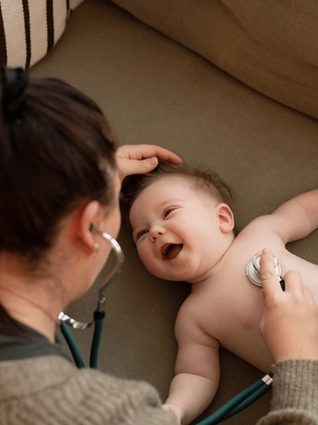
- Home
- Tools And Resources
- Baby Development Calendar
- 5 - 6 Weeks Old Baby | Development
5-6-weeks-old baby
2 min
Babies at this age…
- Will enjoy lying in a bouncing cradle
- Can often hold their heads up for a short while when they are on their tummies.
- Love to look at your face, so get up close and cuddly as often as you like!
- Have you had that first smile yet? If it hasn’t happened already, it will happen soon...
After they are born, babies still naturally curl up in the position they were in the womb - when you hold them, their little legs are often positioned like a frog’s! But by now, your baby will be starting to straighten out and lose that new baby look.
A bit of “tummy time” each day – when you place your baby tummy-down on a mat or blanket - will help your baby’s neck muscles to develop.
Looking after your body post-birth
Your body has been through a huge experience, and recovery takes time – physically and emotionally. Rather than focusing on how you look, try to give your body what it needs to heal: rest when you can, gentle movement like walking, and nourishing food to support your energy and well-being.
Doing your pelvic floor exercises regularly can help rebuild strength and support recovery, even if they don’t feel like a priority just yet. And if you're breastfeeding, it may help your uterus contract back to its pre-pregnancy size.
Every postnatal journey is different, so be kind to yourself – your body has done something incredible.
Postnatal check up
About 6-8 weeks after your baby’s birth, you will have your postnatal check – this is just to make sure that you are recovering from the birth and are well. This may involve checking your urine and blood pressure and examining any stitches you may have had. This is also a chance to ask any questions or to discuss any concerns you have – it may help to write these down beforehand, so you don't forget!
Checks for your baby
Your baby will have routine health checks, too. In the first 6 weeks, these include a hearing test and physical examinations (as well as the newborn blood spot test). The hearing test can be carried out in the hospital or by a health visitor at home. Your baby will have had a physical examination within 72 hours of birth, and another one is carried out at around 6-8 weeks by your GP, health visitor or paediatrician. This is a general all-over check and includes examination of the eyes, heart, hips and, in boys, testicles.
Taking precautions
Your sex life might not be the first thing on your mind right now, but it’s important to use contraception when you become sexually active again. Even if you're breastfeeding or your periods haven’t returned yet, you can still become pregnant.
